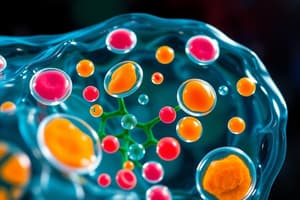Podcast
Questions and Answers
What is the function of the nucleus?
What is the function of the nucleus?
The nucleus houses the cell's genetic material, DNA, and is responsible for storing and managing genetic information as well as regulating the cell's activities.
What is the role of the cytoplasm?
What is the role of the cytoplasm?
The cytoplasm is a complex mixture of water, ions, proteins, and other molecules that provides a supportive medium for the cell's activities.
What is the function of the cell membrane?
What is the function of the cell membrane?
The cell membrane is a selective barrier that controls the movement of materials into and out of the cell, protecting it from its environment and maintaining a stable internal environment.
What is the primary function of mitochondria?
What is the primary function of mitochondria?
Why is understanding cell organelles crucial?
Why is understanding cell organelles crucial?
What is the role of the Golgi complex in a cell?
What is the role of the Golgi complex in a cell?
What is the function of ribosomes in a cell?
What is the function of ribosomes in a cell?
Describe the role of the vacuole in a cell.
Describe the role of the vacuole in a cell.
What are the functions of the endoplasmic reticulum (ER) in a cell?
What are the functions of the endoplasmic reticulum (ER) in a cell?
What are plastids and what functions do they serve in plant cells?
What are plastids and what functions do they serve in plant cells?
Flashcards are hidden until you start studying
Study Notes
Cell Organelles: The Intricate Workings of the Cell's Inner Machinery
Cell organelles are specialized structures within cells that perform specific functions, allowing the cell to carry out its various activities. Understanding these organelles is crucial for understanding how cells function and how they contribute to the overall health of an organism. In this article, we will explore the key cell organelles and their roles within the cell.
Nucleus
The nucleus is a large, membrane-bound organelle that houses the cell's genetic material, DNA. It is the control center of the cell, responsible for storing and managing genetic information, as well as regulating the cell's activities.
Cytoplasm
The cytoplasm is the jelly-like substance that fills the cell and surrounds the nucleus. It is a complex mixture of water, ions, proteins, and other molecules that provide a supportive medium for the cell's activities.
Cell Membrane
The cell membrane, also known as the plasma membrane, is a selective barrier that surrounds the cell. It controls the movement of materials into and out of the cell, protecting it from its environment and maintaining a stable internal environment.
Mitochondria
Mitochondria are the powerhouses of the cell, responsible for producing ATP (adenosine triphosphate), the primary energy source for the cell. They do this through a process called cellular respiration, which involves breaking down food molecules.
Endoplasmic Reticulum (ER)
The ER is a network of tubules that form the cell's endomembrane system. It plays a role in protein synthesis, lipid synthesis, and the metabolism of carbohydrates and lipids.
Golgi Complex
The Golgi complex is a flattened, membrane-bound organelle that processes, sorts, and packages proteins and lipids for transport to their final destinations.
Plastids
Plastids are membrane-bound organelles that store and synthesize lipids and pigments, as well as perform photosynthesis in plant cells.
Vacuole
The vacuole is a membrane-bound organelle that stores water, ions, and nutrients, as well as waste products. It also plays a role in cell division and cell wall synthesis.
Ribosomes
Ribosomes are small, dense organelles that synthesize proteins using instructions from messenger RNA (mRNA).
Cilia and Flagella
Cilia and flagella are hair-like structures that extend from the cell membrane and play a role in cell movement.
Understanding these organelles and their functions is essential for understanding how cells work and how they contribute to the overall health of an organism. Each organelle plays a unique role in the cell, working together to maintain a healthy and functioning cell.
Studying That Suits You
Use AI to generate personalized quizzes and flashcards to suit your learning preferences.




